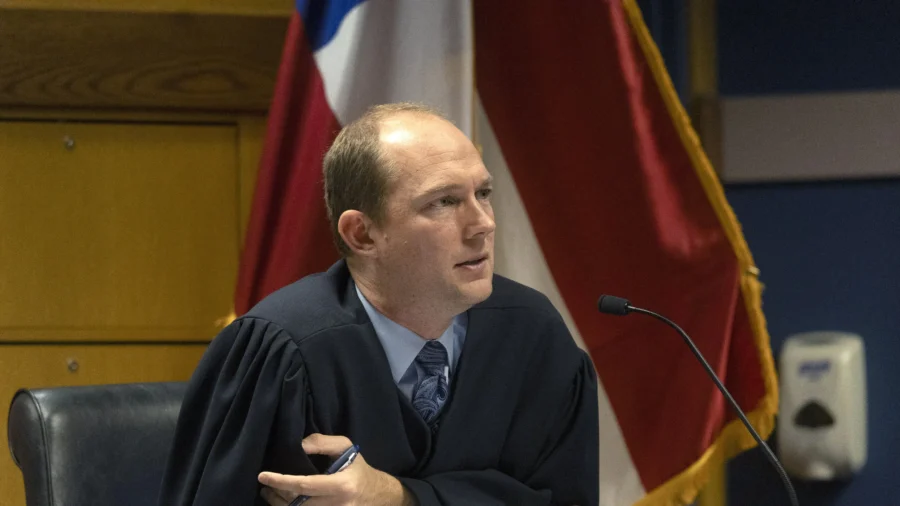Fulton County Superior Court Judge Scott McAfee held a hearing Wednesday afternoon regarding a protective order, after video statements by four defendants charged alongside former President Donald Trump for allegedly interfering in the 2020 Georgia election, were leaked and published in the media. He is expecting to issue an order Thursday morning.
During the hearing, most parties supported a protective order, but attorney Jonathan Miller, representing defendant Misty Hampton, revealed he had leaked videos.
News outlets, including ABC and CNN, had obtained the video statements, or proffers, made by Scott Hall, Sidney Powell, Kenneth Chesebro, and Jenna Ellis, to the Fulton County District Attorney’s office as required by their plea bargains.
The prosecutors filed an emergency motion for a protective order after the leaks, prompting the hearing. Nathan Wade, special prosecutor, Will Wooten, deputy prosecutor, and attorneys for the remaining defendants were in attendance.
Judge McAfee was concerned that the proposed order would result in a long series of hearings concerning what discovery material is sensitive or not sensitive, and needs to be kept under seal.
The defendants were largely in agreement with the prosecutors in having the court issue a protective order, which would keep most of the discovery under seal and not available to the public.
Catherine Bernard, attorney for former Justice Department official Jeffrey Clark, said they were not opposed to the order but did not think one was necessary, as most of the discovery materials are ones that are already available to the public or are being made public shortly via other ongoing cases.
Attorneys for former Marine and Trump campaign worker Harrison Floyd said their client had not leaked the videos, but they had been fielding phone calls from the press at length after what he described as prosecutors misrepresenting the situation and a typo in a statement that made it sound like Mr. Floyd was the source of the leaks.
Attorney Admits Leaking Video
The judge gave each party a chance to speak on the record, and Mr. Miller said he felt it should be on the record that he was one of the leaks.
“All four of those people that did their proffers, they stood in front of you, they did their plea, and it was all recorded and sent out there for the world to see,” Mr. Miller said. “To hide those proffers that show all of those underlying things that went into those pleas misleads the public as to what’s going on.”
Ms. Hampton, a Coffee County election officer, was charged with the same counts as Ms. Powell and Mr. Hall, both of whom took guilty pleas.
“I don’t think those hurt my client. If anything, I believe those help my client, and the public needs to know that,” Mr. Miller said, prompting prosecutors to smile during the live-streamed hearing.
The judge asked whether he believed a protective order would prevent him from making public this evidence during a trial.
“This is a very, very public trial, and I think we all know that,” Mr. Miller said, arguing that to allow otherwise would let the prosecutors set the narrative.
Media Protests
Tom Clyde, an attorney representing several media outlets, including the local Atlanta Journal-Constitution, and Associated Press, argued against the protective order. He said that no parties had provided a substantial showing that physical or economic harm could come to any of the witnesses, as required by the statute they referenced. He said this situation was not similar to the order to protect juror identities.
“There is just not a need for a protective order to be entered into at all,” he said. He said the order would only put materials in discovery under secrecy, “notwithstanding how newsworthy that information is, notwithstanding how much it might inform the public about the circumstances of this case.”
“It’s not a matter of whether both sides agree, it’s a matter of whether the standard has been met,” he said.
Mr. Clyde said it was also not an argument about whether outside parties, including the press, had a right to the information, but whether the court should be putting everything under seal.
“We don’t have a right to demand to see the state’s file, or any defendant’s file, but that’s a very different thing than the court imposing a limit on litigants sharing that information,” he said.
Mr. Clyde said in this case, the state has accused individuals of crimes, and with the proposed order, would then use the court’s power to limit what the accused is allowed to say.
Craig Gillen, representing defendant David Shafer, a former Georgia Republican Party Chair, said the media had no standing in the matter, and the order he has proposed does not impact the ability of the parties to access discovery materials. The order would allow the parties to decide what material should be entered under seal, not deferring all decisions to the judge.
The judge said he noted the First Amendment arguments and would take them into consideration but did not think the case should be tried “in the court of public opinion.”
“I think a protective order mitigates, if not protects against all of this entirely,” he said.
From The Epoch Times

